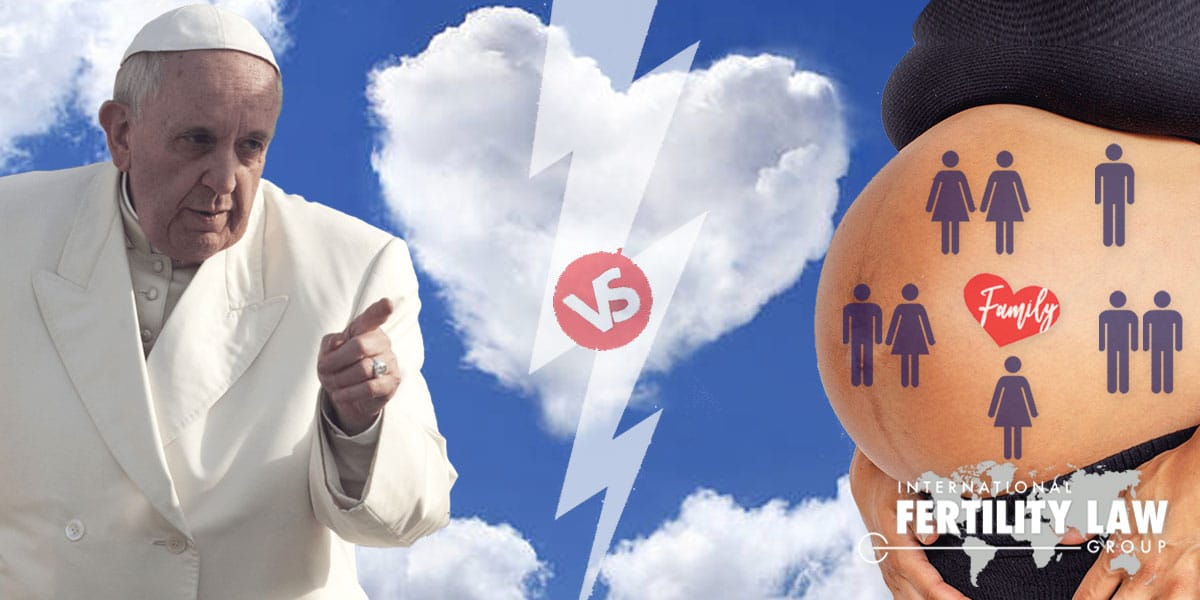
09 Jan 2024 In Defense of Surrogacy: Balancing Religious Values and Individual Choices
Pope Francis recently made an absolute statement advocating for the complete prohibition of surrogacy, a position that reflects the traditional stance of the Roman Catholic Church on assisted reproductive technologies.
While we respect everyone’s right to their own religious beliefs, it is equally important to consider that individuals who do not subscribe to those particular teachings should not be compelled to follow them.
The Pope rightly condemned the exploitation of women which can occur in surrogacy, but from his text, he appears to believe that all women who are surrogates are exploited, which is far from accurate.
In the United States, there is no federal law regulating surrogacy, which is instead left to the states to decide. In the states where surrogacy is legal, there is a comprehensive legal framework to ensure the protection of all parties involved. Reputable surrogacy agencies require potential surrogates to be screened medically and psychologically. There are age requirements, overall health requirements, and requirements for financial stability. Potential surrogates must be drug and tobacco free.
Additionally, intended parents are screened as well, and legal contracts specifying the rights and responsibilities of each party are designed to safeguard the well-being of all individuals involved.
For many couples struggling with infertility or same-sex couples unable to conceive naturally, surrogacy offers a glimmer of hope and a pathway to parenthood. The joy experienced by intended parents when they hold their child for the first time is immeasurable. Surrogacy allows individuals who would otherwise be denied the opportunity to have biological children to experience the profound bond of parenthood. This joyous outcome should be acknowledged and celebrated, recognizing the fulfillment of a fundamental human desire.
While Pope Francis' statement aligns with the teachings of the Roman Catholic Church, it is crucial to respect the principles of religious freedom and the diversity of beliefs within society. Roman Catholics are called to follow the teachings of their faith, and the Church has the right to express its views on moral and ethical issues.
However, the imposition of religious beliefs on those who do not share them is not in line with the principles of a secular and pluralistic society. People of different faiths, or no faith at all, should have the freedom to make informed choices about their reproductive options based on their individual beliefs, values, and circumstances.
The debate surrounding surrogacy highlights the delicate balance between respecting religious values and safeguarding individual freedoms. Rather than imposing an outright ban, there should be room for dialogue that considers the diverse perspectives on surrogacy. A more constructive approach involves fostering understanding, education, and awareness about the ethical considerations surrounding surrogacy, allowing individuals to make informed choices within legal and ethical boundaries.
The call to make all surrogacy illegal by Pope Francis reflects the traditional stance of the Roman Catholic Church. We share common ground with the Pope in decrying the exploitation of women, wherever and whenever that occurs. We would like to see more states and more countries allow surrogacy, and in so doing, establish guidelines that protect women who are considering giving the gift of surrogacy.
Progress is made and dialogue is possible when we recognize areas where our goals align. Preventing the exploitation of women is one such area. We would hope that helping those unable to conceive to the experience the joy of family is another.

















